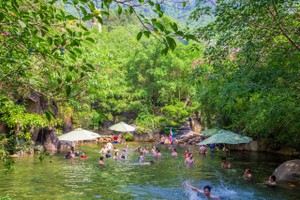 Van Long Nature Reserve in the northern province of Ninh Binh. (Photo: baoninhbinh.org.vn)
Van Long Nature Reserve in the northern province of Ninh Binh. (Photo: baoninhbinh.org.vn)
The event, which was organized by World Wide Fund for Nature in Vietnam in coordination with Hanoi’s Department of Tourism and Hanoi Tourism Association, aims to provide knowledge about responsible tourism and wildlife conservation for 150 tour guides and travel operators.
Vietnam currently has 33 national parks, 57 nature reserves, 13 habitat conservation areas, 53 landscape protection zones and 9 biosphere reserves.
Participants were provided with information that was expected to help identify risks related to brokering and trading wildlife products.
Some good models and lessons on responsible tourism associated with nature and wildlife preservation in the world and Vietnam were also shared at the workshop, thereby helping to change travelers’ behaviors and refrain from buying or selling products from endangered species. They also exchanged views related to this regard.
Nguyen Dao Ngoc Van from WWF-Vietnam said tourism development has increased the number of visitors to tourist attractions, which in turn hikes the demand for resources, putting pressure on the environment and ecosystems.
Some tourists tend to prefer buying products derived from wildlife, thus, leading to the loss of natural landscapes and important eco-tourism sites, she said, adding that this is also the resource that the tourism industry is relying on to attract domestic and foreign tourists.
Van said she hoped that tour guides and travel operators will spread the commitment to protect elephants and wildlife to visitors, helping them to be aware of the need to preserve these species.
The workshop was of practical significance in the context that the tourism industry is developing towards environmental, economic and social responsibility, said Trinh Thi My Nghe, Vice Chairwoman of the Hanoi Tourism Association.
Vietnam currently has 33 national parks, 57 nature reserves, 13 habitat conservation areas, 53 landscape protection zones and 9 biosphere reserves.
Participants were provided with information that was expected to help identify risks related to brokering and trading wildlife products.
Some good models and lessons on responsible tourism associated with nature and wildlife preservation in the world and Vietnam were also shared at the workshop, thereby helping to change travelers’ behaviors and refrain from buying or selling products from endangered species. They also exchanged views related to this regard.
Nguyen Dao Ngoc Van from WWF-Vietnam said tourism development has increased the number of visitors to tourist attractions, which in turn hikes the demand for resources, putting pressure on the environment and ecosystems.
Some tourists tend to prefer buying products derived from wildlife, thus, leading to the loss of natural landscapes and important eco-tourism sites, she said, adding that this is also the resource that the tourism industry is relying on to attract domestic and foreign tourists.
Van said she hoped that tour guides and travel operators will spread the commitment to protect elephants and wildlife to visitors, helping them to be aware of the need to preserve these species.
The workshop was of practical significance in the context that the tourism industry is developing towards environmental, economic and social responsibility, said Trinh Thi My Nghe, Vice Chairwoman of the Hanoi Tourism Association.
























